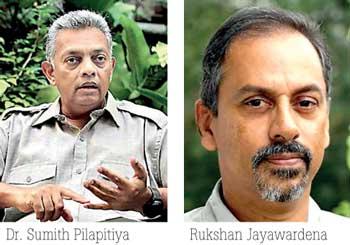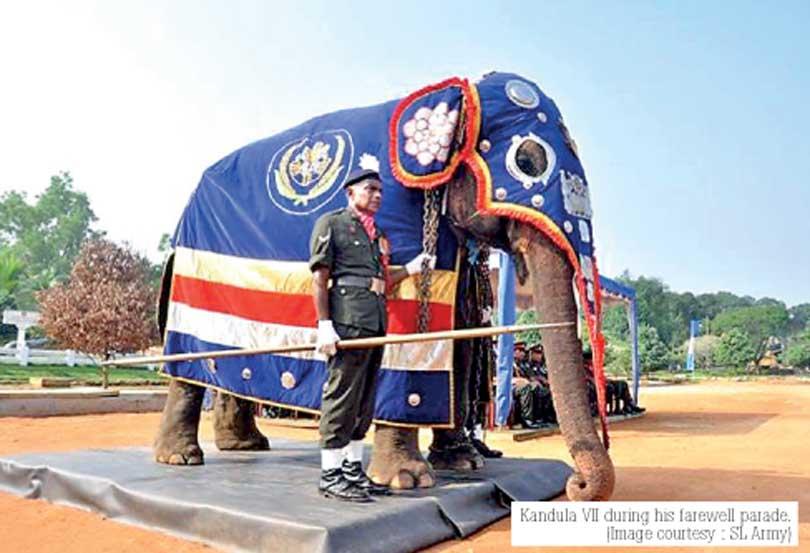11 May 2021 - {{hitsCtrl.values.hits}}

 On the 24th of April 2021, Sri Lanka Light Infantry’s regimental ‘mascot’ Kandula VII killed a soldier while injuring several others. Following this incident a decision was taken to replace this elephant with another baby elephant from the Udawalawe Elephant Transit Home (ETH). Even though Animal Rights activists and elephant experts have for years voiced against the captive elephants in Sri Lanka, their requests fell on deaf ears and the human cost was often overlooked. ‘Kandula VII’ has been a ‘mascot’ since 1961 and so far, seven elephants have been used as regimental mascots. However, arrangements were made to remove the elephant by April 30 and it was subsequently translocated to the Ridiyagama Safari Park.
On the 24th of April 2021, Sri Lanka Light Infantry’s regimental ‘mascot’ Kandula VII killed a soldier while injuring several others. Following this incident a decision was taken to replace this elephant with another baby elephant from the Udawalawe Elephant Transit Home (ETH). Even though Animal Rights activists and elephant experts have for years voiced against the captive elephants in Sri Lanka, their requests fell on deaf ears and the human cost was often overlooked. ‘Kandula VII’ has been a ‘mascot’ since 1961 and so far, seven elephants have been used as regimental mascots. However, arrangements were made to remove the elephant by April 30 and it was subsequently translocated to the Ridiyagama Safari Park.
Pressure on social media
 Animal Rights activists took to social media and posted comments on Army Commander General Shavendra Silva’s Facebook page following the incident. Local and international Animal Rights activists joined the fight in solidarity against holding elephants in captivity. Animal rights activists explained the purpose of the ETH and that it was a place to reintroduce elephants back into the wild. A petition too was being signed to free captive elephants.
Animal Rights activists took to social media and posted comments on Army Commander General Shavendra Silva’s Facebook page following the incident. Local and international Animal Rights activists joined the fight in solidarity against holding elephants in captivity. Animal rights activists explained the purpose of the ETH and that it was a place to reintroduce elephants back into the wild. A petition too was being signed to free captive elephants.
A commendable decision
In response to mounting pressure, Army Commander General Shavendra Silva took steps to reverse the decision to obtain another baby elephant from the ETH and ascertained that as long as he serves as the Commander of the Army that no baby elephant would be held in captivity.
 “This is a welcome move by the Army Commander and he should be commended for taking this decision,” opined renowned wildlife conservationist Rukshan Jayawardena. “The practice of holding baby elephants in captivity should stop because they go on parades and lead a regimented life. Looking after a baby elephant is no easy task. The ETH has been setup to reintroduce elephants back into the wild. Elephants want to move within their own group and they need company. If we are taken out of our group to be looked after by another species, that is slavery. Baby elephants become unpredictable and that incident may have occurred probably because the elephant was angry or frustrated. Or it could be that it was living in conditions that it wasn’t happy about. However, this decision puts a six year old tradition to an end.”
“This is a welcome move by the Army Commander and he should be commended for taking this decision,” opined renowned wildlife conservationist Rukshan Jayawardena. “The practice of holding baby elephants in captivity should stop because they go on parades and lead a regimented life. Looking after a baby elephant is no easy task. The ETH has been setup to reintroduce elephants back into the wild. Elephants want to move within their own group and they need company. If we are taken out of our group to be looked after by another species, that is slavery. Baby elephants become unpredictable and that incident may have occurred probably because the elephant was angry or frustrated. Or it could be that it was living in conditions that it wasn’t happy about. However, this decision puts a six year old tradition to an end.”
The practice of holding baby elephants in captivity should stop because they go on parades and lead a regimented life. Looking after a baby elephant is no easy task. The ETH has been setup to reintroduce elephants back into the wild. Elephants want to move within their own group and they need company.”
Govt. should prioritize welfare of captive elephants
 In response to requests to increase the number of captive elephants in the country, eminent environmental scientist and former Director General of the Department of Wildlife Dr. Sumith Pilapitiya said that Sri Lanka has a practice of using elephants in processions. “While I personally don’t condone this practice, I am also a realist to know that there is no chance that the use of elephants will be discontinued in the near or medium term. While we are arguing on whether or not there should be elephants in captivity, most elephants in captivity at present are being held under appalling conditions. This is especially so of elephants in some temples as evidenced by the many videos going viral on social media of the despicable manner in which some elephants are treated by their mahouts and other handlers. I strongly believe that there should be no increase of captive elephants until there is a significant improvement in the welfare of elephants in captivity. We also need to be realistic and rational about the number of elephants we need in temple processions. It is now becoming a norm to have at least one elephant in every small temple procession or ‘katina perahera’, which I think is completely uncalled for—especially when we are treating our captive elephants in such a bad way.”
In response to requests to increase the number of captive elephants in the country, eminent environmental scientist and former Director General of the Department of Wildlife Dr. Sumith Pilapitiya said that Sri Lanka has a practice of using elephants in processions. “While I personally don’t condone this practice, I am also a realist to know that there is no chance that the use of elephants will be discontinued in the near or medium term. While we are arguing on whether or not there should be elephants in captivity, most elephants in captivity at present are being held under appalling conditions. This is especially so of elephants in some temples as evidenced by the many videos going viral on social media of the despicable manner in which some elephants are treated by their mahouts and other handlers. I strongly believe that there should be no increase of captive elephants until there is a significant improvement in the welfare of elephants in captivity. We also need to be realistic and rational about the number of elephants we need in temple processions. It is now becoming a norm to have at least one elephant in every small temple procession or ‘katina perahera’, which I think is completely uncalled for—especially when we are treating our captive elephants in such a bad way.”
I think Sri Lanka, as a predominantly Buddhist country should have regulations in place to really improve the welfare of captive elephants. Therefore, I think introducing regulations for better welfare for captive elephants AND IMPLEMENTING these regulations should be an urgent priority of the Government.”
“Therefore, I think it is better and more beneficial if all of us focus on ensuring that the welfare of captive elephants is improved significantly. Because every single day that we are arguing on whether or not to have elephants in peraheras, some innocent elephant held captive is being badly ill-treated. While I certainly don’t support elephants in captivity, my bigger concern is to ensure that the poor elephants in captivity at present are better taken care of. Therefore, I think it is incumbent upon the Government and the owners of captive elephants—especially temples that own elephants to ensure that the welfare of elephants is significantly improved. I don’t think there is a single person who would argue against improving the welfare of captive elephants. Buddhist temples should be taking the lead in ensuring the welfare of their captive elephants as compassion and caring for animals is an integral part of Buddhist philosophy. I think Sri Lanka, as a predominantly Buddhist country should have regulations in place to really improve the welfare of captive elephants. Therefore, I think introducing regulations for better welfare for captive elephants AND IMPLEMENTING these regulations should be an urgent priority of the Government."
He further said that better training of our mahouts is critically important because the field of animal training has evolved from ‘dominance based training’ to ‘positive reinforcement training’, but we are still using antiquated techniques of dominance based training. “We should also gradually move towards having our captive elephants in a ‘chains free’ environment. Countries like Nepal and Thailand have started moving towards having their captive elephants chains free, so it is high time that we started moving in that direction. In Nepal, the National Trust for Nature Conservation (NTNC)--previously known as the King Mahendra Trust--has captive elephants they use for tourism in Chitwan National Park. When I was in Chitwan National Park for work in 2015, I saw that all the NTNC elephants were chains free, including when they were transporting tourists into the National Park and even when walking through the crowded streets of the town of Sauraha. NTNC started by retraining their mahouts to adopt positive reinforcement training methods and then gradually moved to training their elephants to be chains free. I think this is what Sri Lanka should also be attempting to do. Advocating for better captive elephant welfare is something that even the most ardent supporter of use of elephants in peraheras cannot disagree with. So I think it is time we concentrated on improving the welfare of Sri Lanka’s captive elephants.”

A virtual wildlife challenge through Sri Lanka
US-based Serendipity Wildlife Foundation has arranged an exciting 476km journey from Wilpattu to Yala via Horton Plains and Uda Walawe. But this time it’s virtual! As exciting as it may sound, this ‘wildlife challenge’ is one that will also keep you fit. You can therefore exercise from the comfort of your home on a stationary bike or a treadmill or do some workouts outside. It could be anything from walking to jogging, cycling, roller blading, skating, rowing or even keeping track of the distance you walk everyday! There is absolutely no hurry as you can do it at your own pace and the funds raised from this event will be in aid of fighting wildlife crime.
The organisers of this event - Serendipity Wildlife Foundation, is raising funds for it’s TUSKS (Tactical Universal Surveillance Knowledge-based System) unit to operate and track local and international wildlife smuggling, trafficking, and poaching. TUSKS works with other organizations and law enforcement worldwide using electronics, artificial intelligence, fingerprints, and surveillance devices. (www.csiwildlife.org)
Interested to participate? Then simply click on www.WildlifeChallenge.net and register. Whenever you exercise, log in your distance on your personal “Wildlife Challenge” page. If you have a fitness device or watch that keeps track, you can synchronize it with the programme. Your virtual trip through Sri Lanka will take you online and show your present position throughout your journey. You can take as long as you want and even take long or short breaks in between as it is not who finishes first, but who completes the challenge!
19 Apr 2024 4 minute ago
19 Apr 2024 32 minute ago
19 Apr 2024 1 hours ago
19 Apr 2024 1 hours ago
19 Apr 2024 2 hours ago